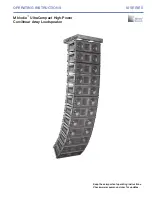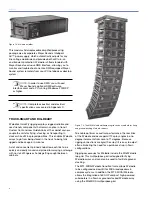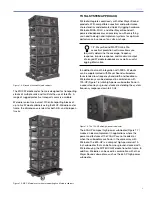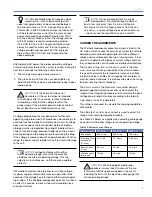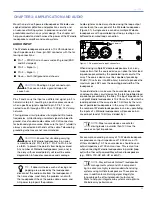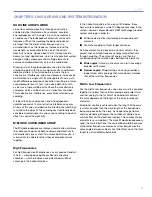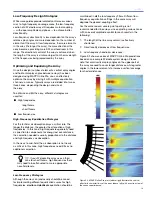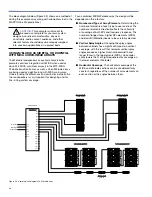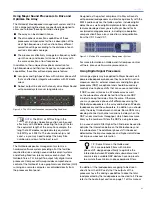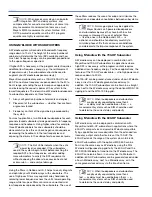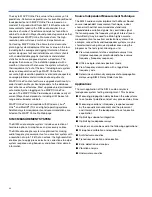
9
CHAPTER 2
TIP:
Since M’elodie does not require a dedi-
cated neutral, it can tolerate elevated volt-
ages from ground and can be connected between
line-line terminals in a 120 V 3-phase Wye system.
This results in 208 V AC between lines (nominal) and
will therefore draw less current for the same output
power compared to operating M’elodie from 120 V
AC (line-neutral). Make sure that the voltage remains
within M’elodie’s recommend operating window
(180 V AC to 250 V AC). The ground terminal must
always be used for safety and the line to ground
voltage should never exceed 250 V AC (typically
there will be 120 V AC from line to ground in the
above example).
After applying AC power, the proper operating voltage is
automatically selected, but the system is muted. During the
next three seconds the following events occur:
1. The main power supply slowly ramps on.
2. The green Active LED on the user panel lights up,
indicating that the system is enabled and ready to pass
audio signals.
CAUTION:
If the Active LED does not
illuminate or if the system does not respond
to audio input after 10 seconds, remove AC power
immediately. Verify that the voltage is within the
proper range. If the problem persists, please contact
Meyer Sound or an authorized service center.
If voltage drops below the low boundary of either safe
operating range (brownout), M’elodie uses stored energy to
continue functioning briefly, and shuts down only if voltage
does not rise above the low boundary before M’elodie’s
storage circuits are depleted. How long M’elodie will con-
tinue to function during brownout depends on the amount
of voltage drop and the audio source level during the drop.
If the voltage increases above the upper boundary of either
range, the power supply rapidly turns off to prevent damage
to the unit.
NOTE:
If voltage fluctuates within either
operating range, automatic tap selection
stabilizes the internal operating voltage. This tap
selection is instantaneous, and there are no audible
artifacts.
If M’elodie shuts down due to either low or high voltage,
its power supply automatically turns on again after three
seconds if the voltage has returned to either normal operat-
ing window. If the M’elodie loudspeaker does not turn back
on after 10 seconds, remove AC power immediately (see
previous Caution).
NOTE:
It is recommended that the supply
be operated in the rated voltage windows at
least a few volts away from the turn on/off points.
This ensures that AC voltage variations from the ser-
vice entry — or peak voltage drops due to cable runs
— do not cause the amplifier to cycle on and off.
CURRENT REQUIREMENTS
The M’elodie loudspeaker presents a dynamic load to the
AC mains, which causes the amount of current to fluctuate
between quiet and loud operating levels. Since different
cables and circuit breakers heat up at varying rates, it is es-
sential to understand the types of current ratings and how
they correspond to circuit breaker and cable specifications.
The
maximum long-term continuous current
is the maxi-
mum rms current during a period of at least ten seconds.
It is used to calculate the temperature increase in cables,
in order to select a cable size and gauge that conforms to
electrical code standards. It is also used to select the rating
for slow-reacting thermal breakers.
The
burst current
is the maximum rms current during a
period of approximately one second, used to select the
rating of most magnetic breakers and to calculate the peak
voltage drop in long AC cables according to the formula:
V pk (drop) = I pk x R (cable total).
This rating is also used to calculate the looping capabilities
of M’elodie.
The
ultimate short-term peak current
is used to select the
rating of fast-reacting magnetic breakers
Use Table 2.2 below as a guide when selecting cable gauge
size and circuit breaker ratings for your operating voltage.
Table 2.2: M’elodie Current Ratings
Current Draw
115 V AC
230 V AC
100 V AC
Idle current
.680 A rms
.360 A rms
.760 A rms
Max. long-term
continuous
(>10 sec)
2.3 A rms
1.2 A rms
2.6 A rms
Burst current
(1 sec)
4 A rms
2 A rms
4.5 A rms
Ultimate short-
term peak
13 A pk
6.5 A pk
15 A pk
CAUTION:
When looping M’elodie loud-
speakers, always take into account the cur-
rent draw of
all
the speakers looped in the circuit,
including the first unit, to select the cable gauge that
will avoid voltage drops.
Содержание M'elodie
Страница 8: ...2 INTRODUCTION ...
Страница 20: ...14 CHAPTER 3 ...
Страница 42: ...36 APPENDIX C ...
Страница 43: ......

